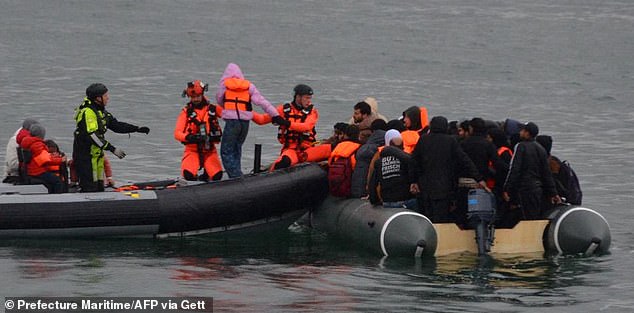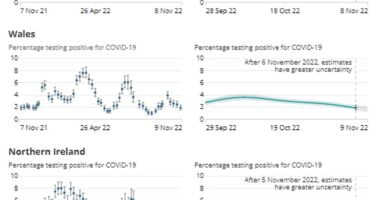I understand why so many British people feel utterly exhausted and despondent about the topic of mass migration — even as it fundamentally and irreversibly transforms our country.
Statistics that once seemed shocking, impossible even, provoke only a jaded response.
Consider, for example, just a few of the figures that were released earlier this week.
Last year, more than one million people came to Britain, most of them from outside Europe, pushing net migration (the overall increase in numbers) to 622,000 in one year, equivalent to about two cities the size of Nottingham.

French officers help migrants off an inflatable dinghy at Boulogne-sur-Mer on Friday after their boat capsized and four migrants died

Prime Minister Keir Starmer with his predecessor, Rishi Sunak, at the State Opening of Parliament. The Rwanda scheme was set up when Mr Sunak was in power
Immigration is now the main driver of our population growth. While so-called ‘natural change’ to the UK population, in terms of more births than deaths, added only an extra 400 people, immigration added more than 600,000.
And while nobody in Westminster will actually tell you this, these trends are set to accelerate in the years ahead.
Over the next 12 years, our population is predicted to increase by 6.5 million, or about 10 per cent — and 90 per cent of that will be due to immigration. That’s enough people to fill five new cities about the size of Birmingham in a few short years.
The fact that these statistics are not constantly at the forefront of the news agenda demonstrates how weary we have become.
In major urban centres, the erosion of age-old British culture is so total that many people have ceased to notice how commonly English is not spoken. In Bristol, for instance, data shows that there are more than 90 languages spoken among 285 ethnic groups.
Our national resignation to these changes has a damaging effect on democracy. Levels of trust in the major parties and our whole political system is at a low ebb, because so many voters feel they have been bamboozled and misled for 25 years.
Politicians have consistently over-promised results on immigration and under-delivered — or, worse, done the opposite of what they pledged to achieve. I think that’s a big reason why, at the General Election, support for the two main parties sank to its lowest level in a century and turnout also crashed.
And it’s why seven in ten ordinary Britons tell pollsters that neither Left nor Right represents their values and views.
So in this escalating crisis, what are Labour going to do? Sir Keir Starmer has described the immigration figures as ‘shockingly high’, but the party has refused to set an ‘arbitrary’ target — meaning it no longer even pretends that it can cap the inflow.
The truth is that it’s already clear that the new government has no serious plan or even interest in curtailing migration, despite formally outlining its plans to do so in yesterday’s King’s Speech.
When it comes to illegal migration, Labour has already scrapped the Rwanda plan, the only viable deterrent we had to discourage hundreds of thousands from crossing the Channel in small boats, despite our non-refundable payments of £270 million to Kigali.
Labour has also committed to overturning Rishi Sunak’s Illegal Migration Act, which took a hard-line approach to dealing with the overloaded dinghies crossing the English Channel, organised by ruthless criminal gangs with no concern for the loss of human life, including children.
Labour has made noises about ‘smashing the gangs’ but I have yet to talk to any expert on immigration and border security who thinks this is possible without a Rwanda-style deterrent to discourage the many thousands still intent on making this perilous journey.
Instead, there will be more managers and committees with impressive but meaningless titles, such as Labour’s ‘Border Security Command’ — an enforcement agency headed by ‘a former police, military or intelligence chief’ who will report directly to Home Secretary Yvette Cooper.
This department will hire hundreds of investigators for a ‘cross-border police unit’, in an effort to dismantle the business model used by the gangs. It will be backed by a ‘returns and enforcement unit’, whose job will be to ensure that failed asylum seekers are returned to their country they came from.
But since more than three-quarters of official asylum seekers are given leave to remain in Britain, and countless thousands more are invisible to the system, this appears to be little more than sabre-rattling. My contacts at the National Crime Agency certainly think so.
In fact, shockingly, Labour has already made clear that it plans to allow the more than 100,000 illegal migrants already in Britain to apply for asylum, thereby giving a big green light for many others to follow them here.
In stark contrast to Britain’s weak approach, governments in Europe are implementing much tougher measures, with the support of the EU.
Last September, European Commission President Ursula von der Leyen announced plans to improve anti-trafficking forces and increase air surveillance over the Mediterranean, to stop the boats from North Africa.
She backed Italian Prime Minister Giorgia Meloni, who has warned illegal immigrants will be ‘detained and repatriated’, while many other member states are considering Rwanda-style offshore processing agreements.
It’s ironic that the UK, which left the European Union in order to take back control of its borders, is now lagging far behind the rest of the continent in its will to address the crisis.
And Starmer’s lack of resolve will make the situation far worse.
Already the number of immigrants risking their lives to cross the sea has been 16 per cent higher this year than last, according to the Migration Observatory at Oxford University.
And it’s not only illegal immigration that will continue to fuel our population explosion; it’s legal immigration, too.
Last year, Labour sketched out vague plans for discouraging employers from hiring low-skilled foreign employees on discounted wages. But even that commitment now appears to have been dumped, along with a proposal to limit the ability of companies to bring in workers on visas, unless firms are also committed to recruiting and training British workers.
Both these pieces of proposed legislation were left out of yesterday’s King’s Speech.
In the meantime, we will see immigration accelerating, bringing hundreds of thousands of new arrivals into a country whose infrastructure is already collapsing under the strain.
Britain already suffers from a housing and homelessness crisis, a failing NHS, a vanishing Green Belt, inadequate public transport and an overstretched police service.
In other, less tangible ways, the problems go even deeper — and will be still harder to fix. Immigration is eroding the very things that make us who we are as a national community. As each wave of immigration replaces the last, our shared sense of identity and culture, our collective memory, risks being washed away.

Kigali, the capital of Rwanda in Africa, where the former Conservative government said illegal asylum seekers could be sent to have their asylum claims processed rather than in the UK

Labour’s Border Security Command – an enforcement agency headed by ‘a former police, military or intelligence chief’ – will report directly to Home Secretary Yvette Cooper
As a professor of politics, I am deeply worried about the health and future of our democracy. When tens of millions of people feel their political system has abandoned them and refuses to respond to their most pressing concerns, that’s a dangerous situation.
Why? Because, inevitably, they will swing to the political extremes, as we can see happening in the U.S., France, and many other countries. It’s only by addressing people’s intense and sincere concerns about these issues that we will genuinely strengthen our democracies.
We need an active, credible deterrent to illegal migration, and a new cap on legal migration. The figure of more than 600,000 should be slashed by half a million. The only migrants we should welcome are those with valuable skills, with something to offer Britain, not those who lack skills, education, and are a drain on our economy and community.
Above all, we need to recognise that the changes taking place in Britain, are unprecedented. We have to stop pretending they are not happening. Because they are. The only question is what are our leaders going to do about them.
■ Professor Matthew Goodwin is author of Values, Voice and Virtue: The New British Politics (Penguin).









